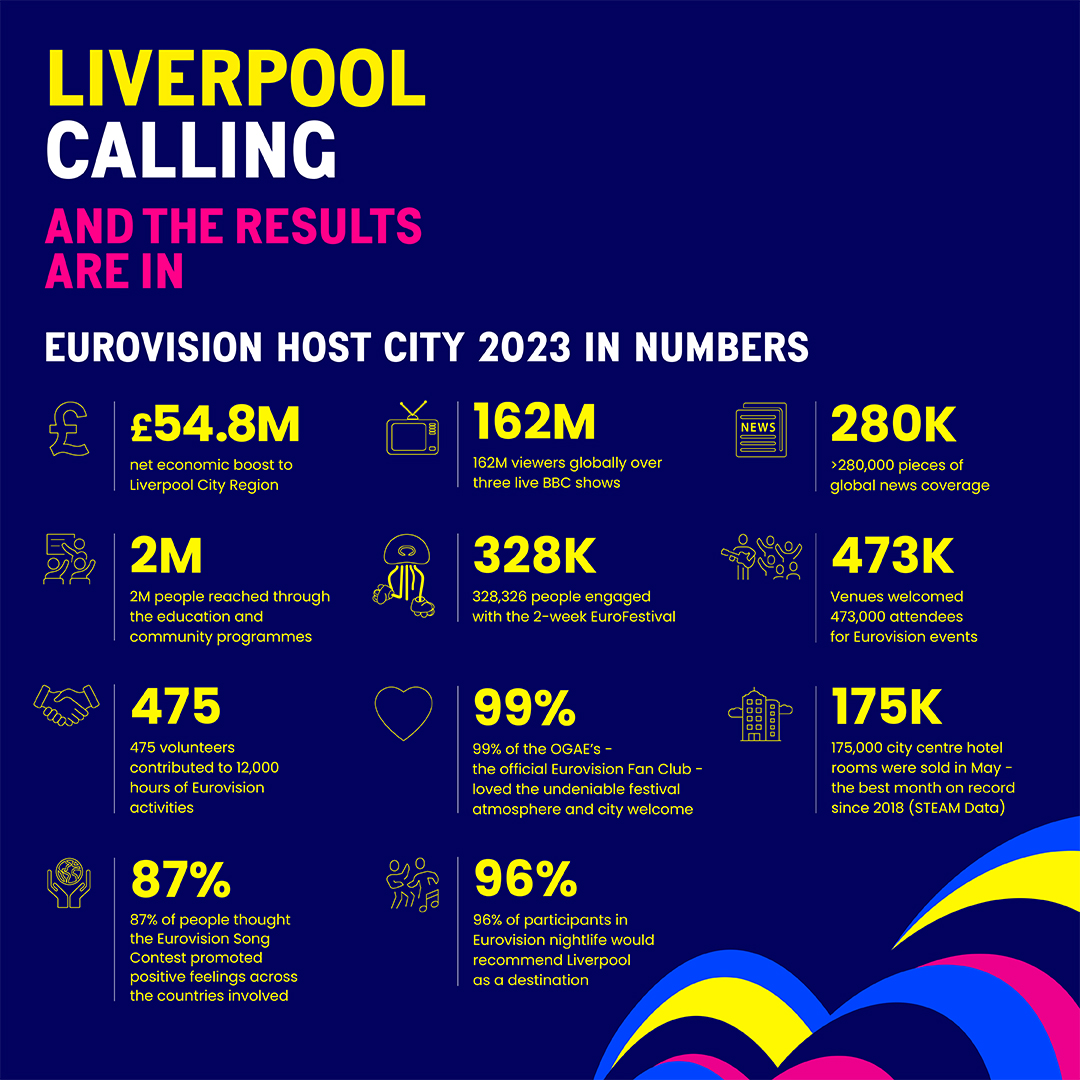Today (Thursday 26 October) Liverpool City Council shares the interim results of what Eurovision achieved for the city.
An independent evaluation commissioned by the council has found that hosting the Eurovision Song Contest 2023 delivered a £54million economic boost to Liverpool City Region.
A summary report produced by the Heseltine Institute for Public Policy, Practice and Place, incorporating findings from evaluation reports on the economic, cultural and wellbeing impacts of the event, describes how Liverpool's experience of hosting major events laid the foundations for Eurovision's success.
A key strand of research was carried out by the University's Professor Rhiannon Corcoran, Professor of Psychology and Public Mental Health. Results indicate:
There was a huge amount of pride around Liverpool being the host city, with 80 per cent of residents noting how important it was for Liverpool and a further 93 per cent saying they were pleased with how the city delivered the event.
Of those questioned, 74 per cent were enthusiastic about Liverpool hosting on behalf of Ukraine and 71 per cent felt that the city's leading role promoted positive feelings across all of the participating nations.
Today's announcement outlines the five in-depth, independent evaluations, commissioned by Liverpool City Council - in a first for any Eurovision Song Contest host city.
Tim Jones, the University of Liverpool's Vice-Chancellor said: "Today's announcement gives us much to be proud of. It was the University's Heseltine Institute that compiled the data that this success is judged on and it was our academics who played an important role in carrying out a key strand of research. But as a civic institution, we are immensely proud of the city of Liverpool. Our city put on a show like no other and I am delighted to see these positive results that I'm sure will have a lasting legacy for those who live, work, study and do business here."
Professor Rhiannon Corcoran from the Institute of Population Health said: "Our survey was designed to understand Eurovision's impact on the wellbeing and sense of community of local residents. The data we collected shows overwhelmingly positive feelings of pride in the city. I'm sure many people will recognise and understand how this is hugely beneficial to wellbeing."
Sue Jarvis, Co-Director at the Heseltine Institute said: "At the Heseltine Institute we were delighted to work with partners across the city to publish this summary of the comprehensive evaluation of what Eurovision achieved for our city.
"Liverpool has a long history of hosting and learning from major events, and these evaluations will help developing understanding of the key lessons from Eurovision 2023.
"While the full legacy will emerge over time, it was fantastic to see that the positive impacts of Eurovision exceeded expectations. Eurovision not only brought immense financial and cultural benefits to the city but also enhanced the view of Liverpool across the UK, Europe and the world."
The reports looked at the economic and social impact of staging the event on behalf of Ukraine, as well as the influence on cultural relations; the impact on wellbeing in the city and the wider city region; the visitor experience and the effectiveness of the strategic collaboration between delivery agencies.

Key data highlights include:
The Big Numbers
- Eurovision boosted the Liverpool City Region economy by £54.8million (net) with restaurants, accommodation providers, shops, bars and transport networks all benefitting.
- In total 473,000 people attended Eurovison events in the city, with 306,000 additional visitors heading to Liverpool to be part of the celebrations.
- In May, 175,000 city centre hotel rooms were sold - the best month on record since 2018. (STEAM Data)
Culture Counts
- The education and community programmes, EuroStreet and EuroLearn, engaged with 367 organisations and directly with 50,000 people, young and old. The overall programme is estimated to have reached 2 million people.
- EuroFestival - the Culture Liverpool curated two-week culture festival - presented 24 brand new commissions, 19 of which were in collaboration with Ukrainian artists. A huge 328,346 people engaged with this programme - 557 artists, 1,750 participants involved in a commission and an audience number of 326,039
- The official Eurovision Village, located at the Pier Head attracted 250,000 visitors across the ten days it was open, with the ticketed final selling out within hours.
Visitor's Views
- Visitors to Liverpool reported an overwhelmingly positive experience. In a survey, 89 per cent of those questioned, felt it was a safe event and 88 per cent praised its inclusivity. A whopping 96 per cent of those surveyed would recommend Liverpool as a destination to visit and 42 per cent of overseas visitors said the city's staging of the event had a positive impact on how they viewed the UK.
- The official Eurovison Fan Club - the OGAEs - carried out a survey and found that 99 per cent of their members felt welcomed in the city and 98 per cent loved the undeniable festival atmosphere.
People Power
- An impressive 475 people provided 12,000 hours of volunteering, covering 350 shifts. The majority (90 per cent) were from the North West of England, and 30 were Ukrainian.
- A Eurovision job recruitment fair saw 394 jobs offered in one day.
- A partnership between the BBC and Liverpool Institute for Performing Arts saw 145 students become part of the Eurovision production - in roles such as on stage dancers in the live shows, costume makers or in the TV production team.
The interim findings of these reports will be discussed today at a special one-day Eurovision event taking place at ACC Liverpool.
The University of Liverpool's Heseltine Institute has compiled the headline findings of the reports which can be found at www.liverpool.ac.uk/heseltine-institute/projects/eurovision2023/
All reports have been supported by the Department for Digital, Culture, Media and Sport and Spirit of 2012.
October's Liverpool Calling is a Liverpool City Council event supported by the Liverpool BID Company and The ACC Liverpool Group.






